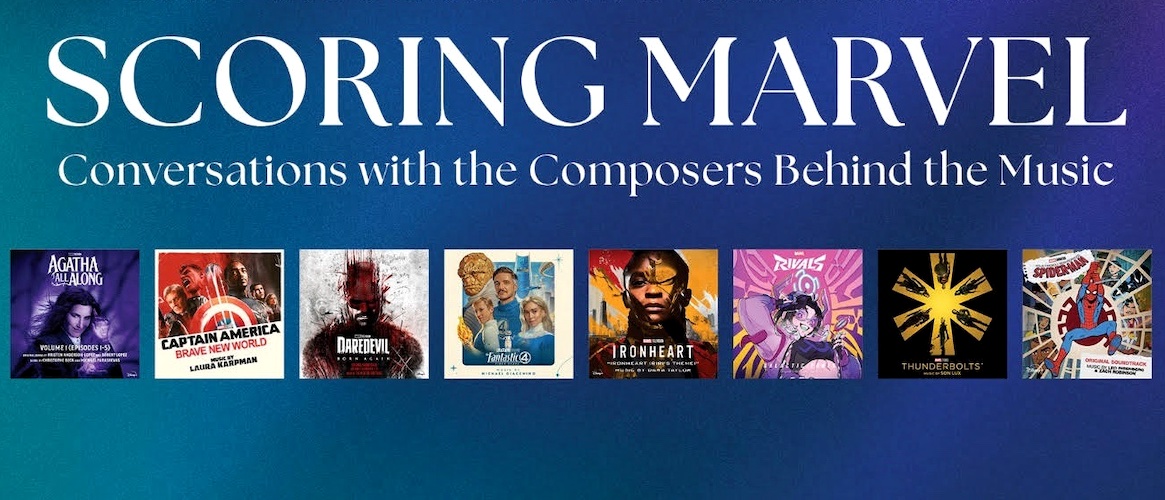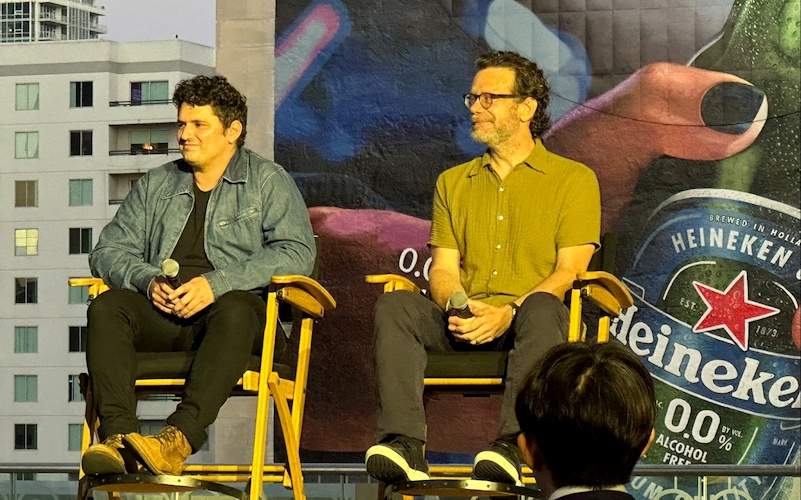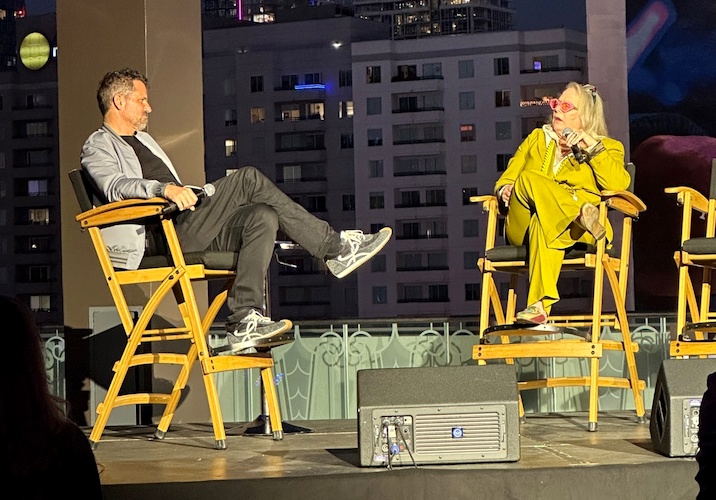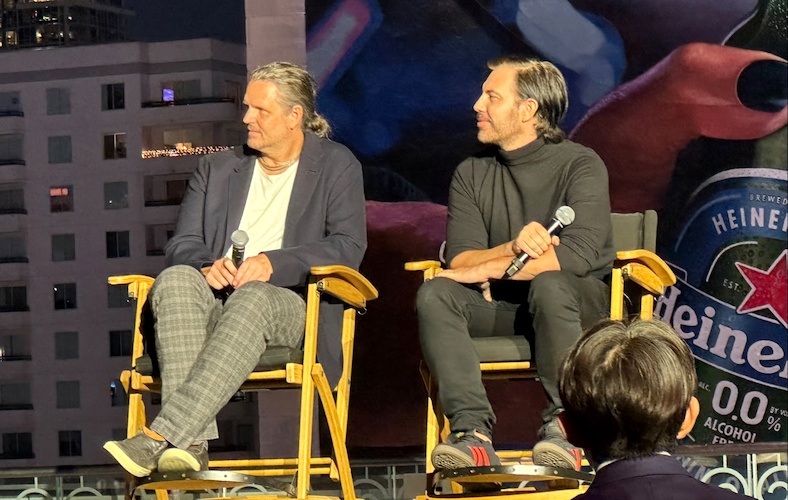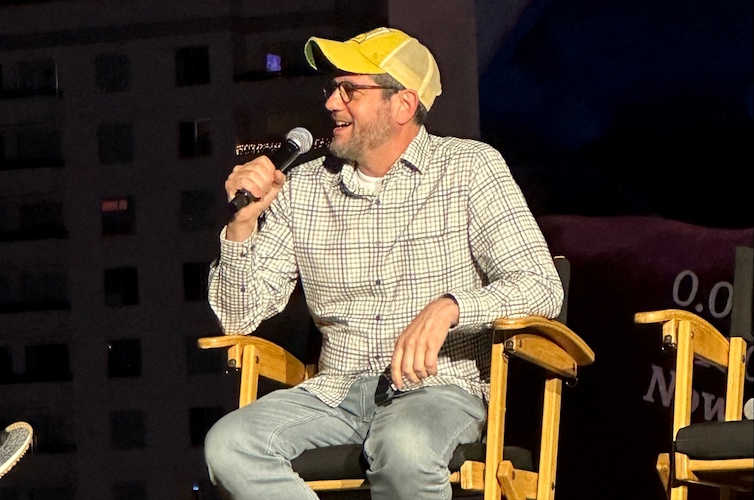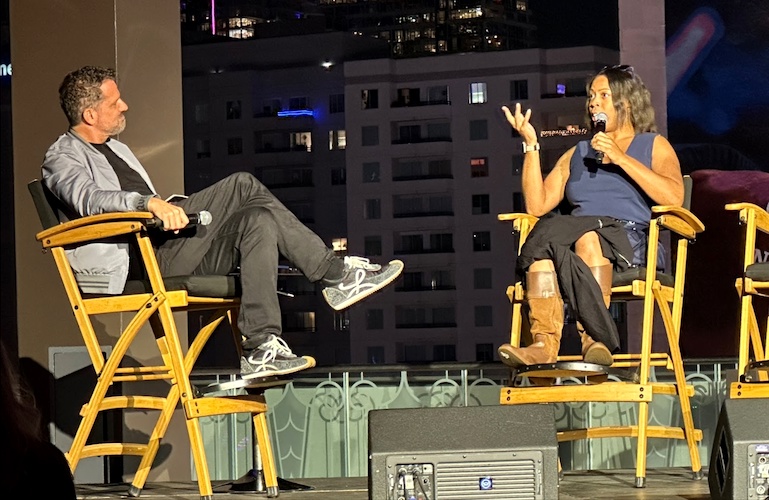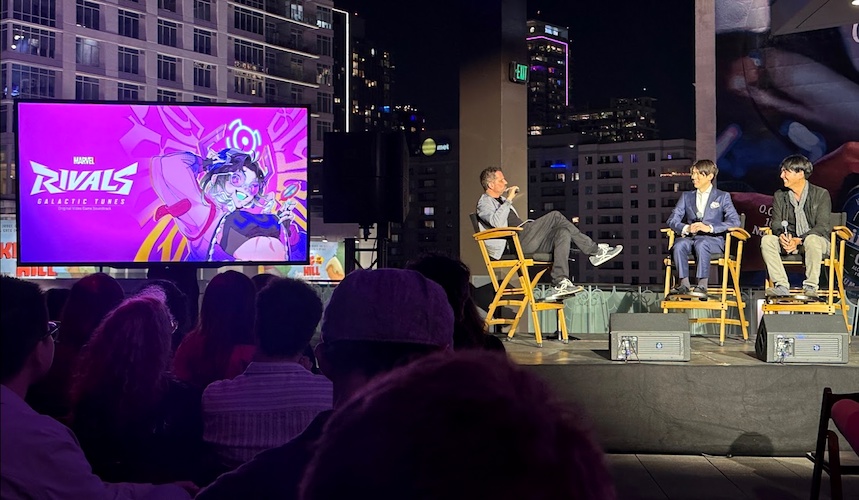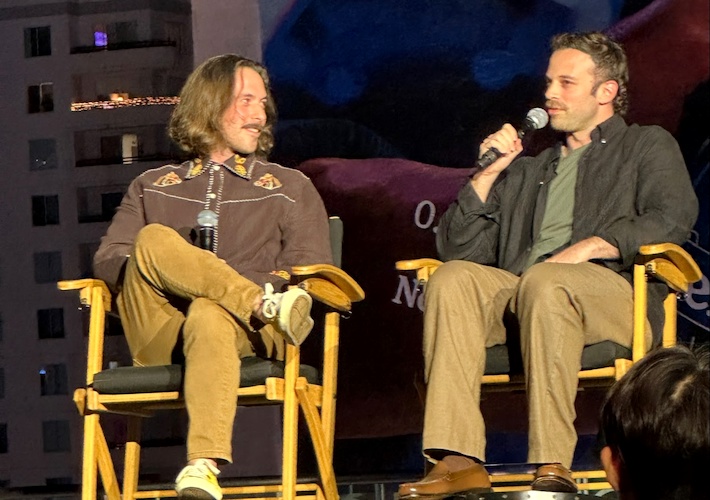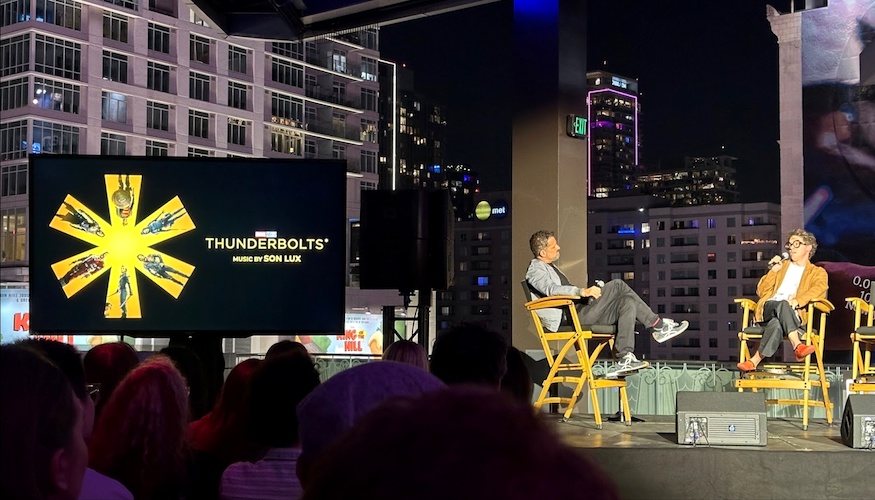Marvel Composers Share Stories About “Fantastic Four: First Steps,” “Agatha All Along,” Daredevil: Born Again,” “Marvel Rivals” and More
A large group of notable composers gathered Monday night at the Grammy Museum for “Scoring Marvel," a special event with the people behind the music for a ton of Marvel-based projects from the past year, whether it be in film, TV, animation or video games.
Moderated by Marvel Studios’ Head of Music, Dave Jordan, the panel – which took place with the cool backdrop of the Grammy Museum's Ray Charles Terrace’s view of Downtown Los Angeles at sunset – featured round robin back-to-back conversations with Christophe Beck & Michael Paraskevas (Agatha All Along), Laura Karpman (Captain America: Brave New World), John Andrew Grush & Taylor Newton Stewart, AKA The Newton Brothers (Daredevil: Born Again), Michael Giacchino (The Fantastic Four: First Steps), Dara Taylor (Ironheart), Masahiro Aoki & Shota Nakama (Marvel Rivals), Leo Birenberg & Zach Robinson (Your Friendly Neighborhood Spider-Man), and Ryan Lott of Son Lux (Thunderbolts*). The participants spoke about the specific challenges of their respective projects, how they incorporate previously written music, and much more.
Agatha All Along
Christophe Beck had previously written the score for WandaVision, which introduced Agatha, and he and Michael Paraskevas spoke about using some of the music written for her in that show but then greatly expanding upon it, especially since we get a very different perspective on Agatha herself in the series. Said Beck, “It becomes a real process of experimentation, especially in the first few episodes. We definitely didn't want to play her as a straight up bad guy. We also wanted to take her character seriously, because there's a lot of depth there. And so from a more technical musical perspective, we did a little bit of exploring."
Beck had collaborated many times now with songwriters Robert Lopez and Kristen Anderson-Lopez, including on Frozen and WandaVision - though Beck humorously pointed out he and Robert’s very first collaboration was much earlier, because they were college classmates in the same acapella group. For Agatha, Lopez and Lopez wrote the crucial “The Ballad of the Witches' Road," a song that is used throughout the series and which Beck and Paraskevas then weaved into the score.
Said Paraskevas, “[The song is in] 10 full moments throughout the show that the writing and story is really built and structured around. And so how we incorporate it in the score is really we tease it and sort of foreshadow these moments. So then when they finally perform the song for the first time, the audience is already familiar with it, and subconsciously already has this connection." Beck added that the very first and very last pieces of music in the show incorporate the song.
Captain America: Brave New World
The opening sequence from the film was shown, in which President Ross (Harrison Ford) gives a speech that leads into a montage catching audiences up on Ross’s story, leading into the stark black and white title card. Karpman praised Marvel for how collaborative they are, noting that her intense score playing over that sequence also intertwined with everyone discussing just how to shape the beginning, with her recalling suggesting, “‘Listen, if you're really making a conspiracy thriller, let's make a conspiracy thriller.’ There were a lot of different kind of cues in there at the beginning. And I said, ‘Listen, we have to play the whole thing as a montage.’ One of the first themes that I wrote was this theme, which is what we call the conspiracy theme, because the whole thing is really a political thriller. And we talked about stylizing the opening titles and really taking it back to kind of a mid century feel to the music - sophisticated, complicated, and having it really referencing those kinds of scores."
Brave New World was the first Captain America movie focused on Sam Wilson, and Jordan and Karpman discussed the inner debate over how much to use or not use the Captain America theme written by Alan Silvestri for the Steve Rogers version of the character. Karpman revealed she had originally really wanted to include a reworked version of the Silvestri theme, which she recorded using New Orleans percussion, but director Julius Onah didn’t feel it was right for Sam. Still, Karpman said she snuck in a little reference to the Silvestri theme at the end of the Brave New World theme. Ultimately though, Karpman said the film kept leading them to go even more into the conspiracy story idea, with the main titles at the end even getting changed to lean more from their initial conception back into that darker music.
Daredevil: Born Again
For Born Again, the show was reviving Charlie Cox’s version of the Man Without Fear from the old Netflix series, and so the decision was made that the Newton Brothers definitely would use what John Andrew Grush described as, “John Paesano’s amazing theme. Objective number one was don't mess that up because that works. In this case, we had Daredevil’s theme, and we turned that into Matt's theme, which is different, but we wanted to make sure they work together. It’s a bit of a different story now with Born Again, because we're talking about Matt not wanting to be Daredevil. And so from there, that sort of leads on the musical journey of sort of having a unique identity for Matt and Daredevil."
The Newton Brothers also score another Marvel series, X-Men ‘97, and Taylor Newton Stewart said that show’s pacing requires a very different musical approach, explaining with X-Men, “It comes very quick and fast. There’s a lot more music. The slow burn isn't really as much of a thing… It’s not a thing at all! it goes almost like a soap [opera] in a lot of ways like the original and it goes from one story to the next so quickly, and in a blink of an eye you could miss something. So I think thematically, you have to follow that. Transitions are a whole thing. Daredevil’s obviously a much slower burn and Matt cries and there is sadness and things are happening. But with X-Men, it's like, boom, boom, people are dead!"
The Fantastic Four: First Steps
The prolific Michael Giacchino has a ton of Marvel projects among his very long resume, but his main theme for First Steps has quickly become a fan favorite. Giacchino noted the unusual situation with it, recalling “I wrote that theme over a year ago. It was June last year, because Kevin [Feige] came to me and said, ‘Hey, we're going to do something for Fantastic Four for Comic-Con in a couple of weeks. You up for writing some music for it?’ And so I thought, ‘Well, why don't we do the main theme?’ I hadn't written anything yet. I was like, ‘Let’s do the main theme and let's do Galactus’ theme.’ We just recorded a bunch of music. And I'll never forget being at Comic-Con and they did this insane drone show, and seeing Galactus sort of rise above the stadium there and the music was going and then it just starts blasting through the whole downtown area. And I was like, ‘What is going on here? This is the most insane thing. They haven't even started shooting this movie yet!’ It was so great."
Giacchino said he ultimately really enjoyed writing something so identified with a film that early, noting the only other time he did that was for The Batman. Besides DC’s Batman, on the Marvel side, Giacchino’s written music for the Tom Holland Spider-Man trilogy, Doctor Strange and Werewolf By Night (which he also directed), but said for Fantastic Four in particular, “It was just a joy, because I wanted to do a Marvel theme that had no angst in it. I just wanted to have fun and do something positive. And for me, growing up, NASA was everything and I would run home to watch those space shuttle launches." He said he pitched Feige on the idea of the score being a mixture of The Right Stuff and the Main Street Electrical Parade theme, with Feige responding by telling him he loved the Main Street Electrical Parade. Added Giacchino, “It became this very sincere, positive sort of look at the world that the Fantastic Four had created once they became these heroes on this other Earth."
A huge standout aspect of the Fantastic Four theme is the choir who actually sing the words “Fantastic Four" and Giacchino and Jordan laughed about what a wild pitch that was and Feige’s initial skepticism. It was a suggestion Giacchino himself had some doubts about after he made it and got the go-ahead to give it a shot. “I honestly wasn't even sure if it was going to work or not. I'm like ‘Maybe this is my last Marvel movie.’ But I did it with the choir and the second I heard the choir do it, it just knocked you over. And I was like, ‘Oh, for me, it works so well.’ I fell in love with this sound of what they did with their voices through the whole thing. And I was just hoping they would like it. So when I played it for Kevin and Matt [Shakman], they were both 100% on board."
Ironheart
Dara Taylor spoke about how she wanted the music in Ironheart to reflect the title’s character’s state of mind, noting for Riri Williams, “The thing about her is that her mind never stops working so there was this kind of angst in the music as well; this kind of constant ticking, constant thinking." The music also reflects Riri’s grief at times, as she processes the loss of her beloved stepfather - something Taylor could relate to, having lost her own father eight years ago.
Said Taylor, “There's a scene in episode five where she's looking at these kind of projections of her and her father when she's younger. And so I took the last voice note I never got from my dad and I put it through PaulXStretch and I just made it this kind of eerie thing that just kind of moved throughout the cue. So here a little bit at the beginning and then at the end, I kind of lingered on it a little more. And that was just my way of bringing him into [this]."
One other major theme Taylor got to introduce was for (spoiler alert!) Mephisto, and she explained, “I wanted it to feel old and ancient." Because Mephisto is not actually introduced until the finale, Taylor added, “I had to find ways to tease him throughout. So I kind of connected him with The Hood itself. And in addition to creating his own theme, there was this little motif that I built from Faust every now and then because of Mephistopheles and there’s a song where he tries to sell himself to Faust." She added she also used a lot of vocals, though in a far darker way than Fantastic Four. “I had a really fun time with this choir in Australia and doing a lot of whispering that I would then reverse."
Marvel Rivals
Masahiro Aoki described writing the music for the game Marvel Rivals as “Definitely the biggest challenge in my entire career." As Shota Nakama pointed out, “There’s a lot of music. And also the difference is that it's not linear and you don't have a definite beginning and definite ending and you don't know how long the player is going to spend in each stage. Some people may play for 100 hours. It's pretty insane."
Said Aoiki, “I’m not only the composer, I also performed all the guitar tracks myself. I focused on making the music sound powerful and energetic and passionate. One thing I love about video game music is that music not only influences the creative emotion, but it also influences the creative action. And especially in a video game like Marvel Rivals, the music has to ignite the player's will to fight. So as the composer, I hired myself as a rock star hero. I gave myself full permission to go wild."
Your Friendly Neighborhood Spider-Man
Leo Birenberg and Zach Robinson said it was definitely intimidating creating new music for a character like Spider-Man who not only has already had so many different adaptations, complete with their own music, but is so very popular. Birenberg revealed that after they got the job, “We started a game where when either of us was traveling, we would just count Spider Man backpacks." With Spidey movie veteran Giacchino sitting right near him, he joked that if they screwed it up, “We’d get a call from Michael, going ‘Guys, what are you doing?!"
The duo said they let the specific vibe of the show guide their music, with Robinson noting, “I think what's special about this show, and the thing that we love the most about it, is it's 10 episodes and you spend a lot of time with Peter. You spend a lot of time with him in school and it's not always just fighting villains. We really like the slice of life part of this show. We have our Marvel epic action stuff, which we love, and then we have kind of our lo-fi world, our world where he's in school and he's just hanging with his friends. And I could just watch an entire series of just that, honestly.
Robinson added that with the lo-fi music approach, their thought was, “‘This is what Peter’s listening to. Let’s just lean into that.’ It also kind of helps lean into the New York of it a bit, which in the past has been sort of a jazz sound but we didn't want to do that."
Thunderbolts*
As Giacchino mentioned, it’s highly unusual for a composer to write a theme for a film before that film has been shot, which makes Thunderbolts* all the more remarkable, since the band Son Lux wrote a ton of different music long before production began, while the script was still being rewritten. Lott had previously scored a film for director Jake Schreier, who had a lot of trust in Son Lux, with Lott recalling, “He was on my couch every week for four months and it was just us working through basic themes before he presented anything to Kevin [Feige]."
With the creative team all completely onboard, Lott added, “By the time that the first table read happened, we had a whole suite – one of many – but we had a whole suite that kicked off their first table read, because Jake was so confident and Kevin was so confident that this is the sound of the film."
Lott said they got some wonderful thank yous when the film was finished for the inspiration their music provided, recalling, “After the premiere, it was so cool to hear from the actors, one by one, about ‘Oh, Jake played us this cue before we went on set!’ and ‘This is the sound of this scene’ and stuff like that. It’s such a rare privilege."
As the panel was wrapping up, Lott remarked, “I just want to say it's such an honor to be part of this community of creative people and to be part of this Marvel family. This is pretty surreal, to be up here with these people who have accomplished so much. This s*** is not easy, and I just want to say to each and every one of you, I know it's not easy and great job and thank you for being you."
You can read more at this link about what Son Lux had to say about the unique process of writing the score for Thunderbolts*.
More From Marvel:



